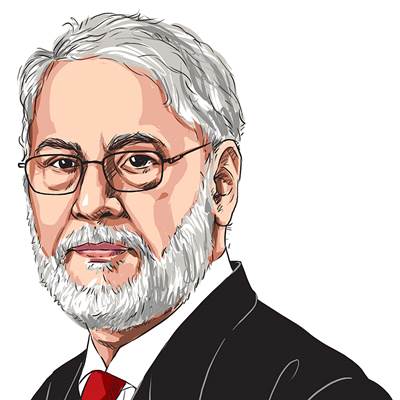Opinion The Munir-Trump tango has risks for both the US and Pakistan
The immediate impulse to invite Munir came from the India-Pakistan conflict, but Trump is also thinking about Iran
 The meeting has taken place against the backdrop of an escalating conflict between Israel and Iran, where Trump has shown clear and strong support for Israel and demanded Iran’s “unconditional surrender” (AP Photo)
The meeting has taken place against the backdrop of an escalating conflict between Israel and Iran, where Trump has shown clear and strong support for Israel and demanded Iran’s “unconditional surrender” (AP Photo) The chief of the Pakistan Army has been an honoured guest of the White House on three occasions. The first was General Yahya Khan in 1970 on the eve of the Bangladesh crisis. The second was Pervez Musharraf in 2001 when Pakistan was needed for the US war in Afghanistan. Both also happened to be the president of Pakistan at the time.
However, why Field Marshal Asim Munir was invited to lunch by President Donald Trump on June 18 is a bit of a mystery. He is not the head of the government, and as such, protocol would suggest that the head of the US Joint Chiefs of Staff or the Secretary of Defence be his host. Munir was invited to visit the US in early June, and his official five-day visit began on June 15.
Why would the great Donald Trump, who, as it is, has an exaggerated notion of his own worth, invite an army chief of a Global South country, whose economy is in shambles, to lunch?
The ostensible and somewhat implausible reason was contained in a statement by White House spokeswoman Anna Kelly, who said, “President Trump will host Field Marshal Munir after he called for the President to be nominated for the Nobel Peace Prize for preventing a nuclear war between India and Pakistan.”
Trump himself said in his remarks during and after the lunch: “The reason I had him here was I wanted to thank him for not going into the war and ending it… This man was extremely influential in stopping it from the Pakistan side. Modi from the Indian side and others. They were going at it, and they are both nuclear countries. I got it stopped.”
While there has been no official statement from the White House after the lunch, the Pakistan Army said in a press note that “President Trump expressed keen interest in forging a mutually beneficial trade partnership with Pakistan based on long-term strategic convergence and shared interests.”
There is another shady subtext to the meeting. In April, a deal was reached between a Trump family-owned firm and Pakistan’s newly created Crypto Council. A high-profile team of executives travelled from Washington to Islamabad to sign the deal. The team was personally welcomed by General Asim Munir, and a closed-door meeting was held with both Shehbaz Sharif and Munir present. Beyond all this, the Trump-Munir meeting can be seen as a high-stakes diplomatic manoeuvre with implications for US-Pakistan relations, the Israel-Iran conflict, and South Asian stability.
No doubt, the immediate impulse to invite Munir came from the India-Pakistan conflict. Note that as the India-Pakistan crisis peaked on the evening of May 9, the US Secretary of State had directly called Munir and obtained a commitment from him for pursuing a ceasefire offering as inducement “US assistance in starting constructive talks in order to avoid future conflicts.”
Other factors were at play here, including a heightened US interest in restoring its close ties with Pakistan. This is evident from the somewhat grandiose statement on June 10 by Lt Gen Michael Kurilla, the chief of the US Central Command (CENTCOM), to the US House Armed Services Committee that Pakistan has been “a phenomenal partner in the counter-terrorism world”.
The Israel-Iran war broke out three days later. In that sense, the visit and the lunch have not been directly connected to the developments in West Asia. But certainly, the lunch would have been an opportunity for the US President to secure Pakistan’s neutrality or alignment against Iran.
This became an important objective as Israeli strikes have degraded Iran’s air defence infrastructure and its nuclear capacity (for now). General Mohsen Rezai, a member of Iran’s National Security Council, claimed that Pakistan had promised that it would launch a nuclear strike against Israel if it used such weapons against Iran. This was swiftly denied by Islamabad, though it did express open support for Iran in the confrontation with Israel.
Besides this issue, the US is also largely concerned with the fact that Pakistan has a poor record when it comes to its own nuclear proliferation, having set up a clandestine nuclear bazaar in the past. The worries are that rogue scientists (like the late A Q Khan) could be used by Iran to turn the last screw in fabricating their nuclear weapon.
The Munir-Trump tango has risks for both the US and Pakistan. Washington cannot be oblivious to the fact that its recent actions in relation to Pakistan will alienate India. From Islamabad’s perspective, dalliance with Washington could upset Iran and destabilise its western borders, where there is an ongoing Baloch militancy.
Munir was reportedly empowered to discuss Kashmir with Trump, raising concerns in India about US involvement in the dispute. Any US acknowledgement of Pakistan’s position will strain US-India ties, though given the situation, the meeting would have focused more on Iran than South Asia.
The meeting has taken place against the backdrop of an escalating conflict between Israel and Iran, where Trump has shown clear and strong support for Israel and demanded Iran’s “unconditional surrender”. Pakistan has long been seen as a strategic asset by the US for its location and willingness to go along with the US’s security agenda in West Asia and South Asia. Now, after a hiatus, the US is seeking to reinforce those ties.
The writer is a Distinguished Fellow, Observer Research Foundation, New Delhi






